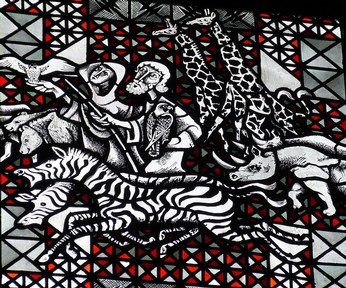Quiz Answer Key and Fun Facts
1. Many are familiar with the prophet Balaam and how his ass speaks to him. According to the book of Numbers, Chapter 22, the donkey speaks after Balaam beats it three times for its stubborn refusal to continue down a path. However, why does the donkey refuse to move forward and at one point even crushes Balaam's foot against a wall along the path?
2. The people of Judah have abandoned their faith, and a prophet delivers a series to sermons to warn them of God's impending judgment and the eventual destruction of Jerusalem. In his First Sermon, the prophet compares Judah's willful worship of idols to a stubborn donkey obsessed with sexual intercourse: "A wild donkey used to the wilderness, / That sniffs at the wind in her desire; / In her time of mating, who can turn her away? / All those who seek her will not weary themselves; / In her month they will find her." Who is this major prophet who speaks these words and ultimately laments Judah's refusal to repent?
3. The earliest Biblical reference to a man riding a donkey is at the beginning of Genesis, Chapter 22. We are told, "Abraham rose early in the morning and saddled his donkey, and took two of his young men with him, and Isaac, his son". Apparently, two or three of them had to walk. After a three-day journey, Abraham found the spot he was looking for and commanded the two young men, "Stay here with the donkey; the lad and I will go yonder and worship". However, what did Abraham truly intend to do?
4. In Genesis 42, ten of twelve brothers enter Egypt to buy grain for their starving families. The governor they encounter commands them to go home and return with their youngest brother, and he keeps one of the brothers as collateral. The brothers' donkeys are loaded with sacks of grain, and on the journey home, one brother opens a sack to feed his donkey. Surprisingly he discovers that the sack also contains money. They now fear that they will be charged as thieves and spies. However, they have nothing to fear, for the governor they spoke to turns out to be which individual?
5. In 2 Kings 6:24-29, the people of Samaria during the time of the prophet Elisha are so famished as a result of Syria's siege, they resort to eating the heads of donkeys and the droppings of doves--and pay great amounts of money for these. However, this is not the worst. A woman is wailing to the king of Israel because she has eaten what?
6. Who, in the book of Judges, Chapter 15, kills one thousand men with the jawbone of an ass?
7. In Luke 13:15, Jesus rebukes a priest of the synagogue by saying, "Hypocrite! Does not each one of you on the Sabbath loose his ox or his donkey from the stall, and lead it away to water it?" Jesus is referring to a law from Exodus 23, which requires the Hebrews to rest not only themselves but their ox and ass on the Sabbath as well. However, what has led Jesus to speak these words to the priest?
8. Consider these two verses: "He sends the springs into the valleys, / Which flow among the hills. / They give drink to every beast of the field; / The wild donkeys quench their thirst." In what book of poetry, known for its celebration of God and the creation, would one find these words?
9. In 2 Corinthians 6:14, Paul writes, "Do not be unequally yoked together with unbelievers. For what fellowship has righteousness with lawlessness? And what communion has light with darkness?" Many scholars argue that Paul is harking back to one of the Laws of Separation in the book of Deuteronomy 22:10. In this verse, the Hebrews were told not to plow with a donkey and what other animal yoked together?
10. Matthew 21:7 reads: "They brought the donkey and the colt, laid their clothes on them, and set him on them." Who is it that appears to ride into Jerusalem on both a donkey and a colt simultaneously in this passage?
Source: Author
alaspooryoric
This quiz was reviewed by FunTrivia editor
agony before going online.
Any errors found in FunTrivia content are routinely corrected through our feedback system.
